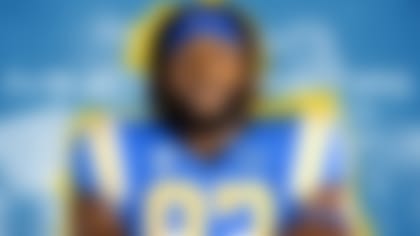It's been a long, arduous journey back from a devastating hip injury that almost finished his career, but Alabama quarterback Tua Tagovailoa is finally fit to take on the NFL, thanks to his family and faith
By Steve Wyche | Published April 21, 2020
Tua Tagovailoa and his father, Galu, are standing over the grave of Seu Tagovailoa, the family patriarch who died in 2014 after moving his family from Samoa to Ewa Beach years ago. They won't be here long on this glorious mid-January day.
It's a brief visit to Hawaii for the Polynesian Football Hall of Fame ceremonies, and they have just a few days before returning to their home outside of Tuscaloosa, Alabama. So, they're here to pay respect to the man who accurately predicted more than a decade ago that his grade-school grandson, Tua, would become a great football player.
Tua has just finished a call, begun during the ride to the cemetery, with the member of an AFC team's personnel staff who was attempting to gather information about Tua and some of his former Alabama teammates. The process of his transition from Alabama to the NFL is just starting to heat up, but the uncertainty surrounding his surgically repaired hip is creating more questions than answers, even for Tua.
Much of the conversation with the personnel man is taking place in private, away from the small gathering at the gravesite. It's difficult to know exactly what is being said, and nobody asks, either. This is Tua's time.
After a few minutes, they get back into a large rented SUV, with Galu driving, Tua seated behind him, a camera operator chronicling Tua's draft journey riding shotgun and a marketing agent next to the quarterback. A longtime family acquaintance is seated in the rear.
Exiting the cemetery, Tua pulls out his phone and auxiliary cord and asks his dad to link it to the SUV's sound system. "Please plug this in, Dad," he says politely. Galu silently obliges.
A song by Shania Twain begins to play.
Shania Twain?
Tua is asked if he liked country music before he went to Alabama.
"I actually did," he says. "An old girlfriend from here (Hawaii) liked it, and I got into it."
It's Country Carpool Karaoke in Tua's rented ride, which contains one of the most recognizable collegiate quarterbacks in recent history and a crew of grown men -- all sober.
After Shania and a few other old-school country tunes play, a medley of classic soul music begins to spin. Direct hit to the wheelhouse of most of the SUV's passengers. The Chi-Lites. The Stylistics. The Delfonics.
Tua's accuracy is not hyperbole. At this moment, he's right on target.
Didn't I blow your mind this time, didn't I?
After a few songs, Tua excitedly sets his attentive audience up for what he swears is his jam: Gregory Abbott's "Shake You Down."
He sings his heart out. Loud, too, like he's changing a play at the line of scrimmage in front of a deafening crowd against LSU in Death Valley. He's in his zone.
On April 2 -- 21 days from the 2020 NFL draft and about 10 weeks after that visit to Honolulu -- the results from a medical re-check on Tagovailoa's surgically repaired hip are positive. Like, there-shouldn't-be-any-more-concerns positive, according to people close to the quarterback.
The day before, fresh off a throwing session in Nashville with former Super Bowl-winning quarterback Trent Dilfer, Tagovailoa had already publicly declared himself "100 percent," saying he could perform in a game at the same level he did before sustaining the dislocation and fracture of his right hip that ended his season last November.
"Things have really worked out," said Dr. Chip Routt, who performed Tagovailoa's hip surgery at Memorial Hermann-Texas Medical Center in Houston two days after the injury. "Most people could achieve what he has if they have the discipline he has. He has a lot of motivation to recover well. He's ahead of schedule a little bit. He's done an extraordinary amount of rehab. He was respectful of our rehab and protection instructions. He stayed within the parameters of what we outlined for him.
"He's been studied and examined more and with more X-rays and [MRIs] than any patient I've dealt with."
Tagovailoa likely would have gone through even more tests, X-rays and MRIs if team doctors could have seen him after the NFL Scouting Combine like they'd hoped. Most teams' medical staffs put him through their own examinations in Indianapolis in February, but because of NFL restrictions due to the coronavirus pandemic, teams have not been allowed to examine him since he declared himself good to go on April 1.
But Tennessee Titans physician Thomas Byrd was able to re-examine Tagovailoa on April 2 after doctors from other clubs chose Byrd to perform tests on Tagovailoa, with input submitted by teams on the type of exams to be conducted. Per NFL rules, a player can be examined by a neutral doctor in his local market, and since Tagovailoa was in Tennessee training, Byrd -- a highly respected Nashville hip surgeon -- was a logical choice.
Though Tagovailoa's representatives and doctors have publicly stated he is healthy, each team has its own subjective evaluation of the test results. The conclusions those teams draw could determine where Tagovailoa gets drafted, although multiple NFL personnel staffers and coaches expect him to be selected within the top six picks, with the Bengals (No. 1 overall), Dolphins (No. 5) and Chargers (No. 6) being quarterback-needy teams selecting at the top of the draft.
"I have no control over the circumstances or situation," Tagovailoa said. "If I was healthy [or] if I wasn't, I would have no control. So, the best thing I can do is continue to work. Whatever team decides to choose me, I would be grateful."
On Friday, six days before the start of the draft, Chargers GM Tom Telesco -- who acquired guard Trai Turner and tackle Bryan Bulaga, both right-side (a lefty's blind side) offensive linemen in free agency -- was asked if he was concerned about the medical evaluations on Tagovailoa. He declined to discuss Tagovailoa specifically but said he feels good about the medicals his team has on every player who was evaluated at the combine, including the Alabama quarterback.
"There were over 330 players at the combine and we got our hands on every single one of them and did a physical on all of them,' Telesco said on a video conference with reporters. "We feel like we have enough medical information on every player going into the draft. We do have to make some projections, moving forward, as far as medical risks."
Tagovailoa held a 72-throw "pro day" workout April 9 at Lipscomb Academy's indoor facility in Nashville. Video from the workout was distributed to all 32 teams. On the tape, he didn't appear to have any physical limitations.
"The kid has as much horsepower as you could ever want and incredible twitch to go with it," said Dilfer, who has been working with Tagovailoa since he declared for the draft in January.
Routt, who has not seen Tagovailoa since performing the surgery on the quarterback's hip, said in early April that he has been in repeated contact with all the doctors who examined the quarterback throughout the process. As for the likelihood of the previous hip injury pre-disposing Tagovailoa to future problems, Routt is trying to lay those concerns to rest.
"No, he is not susceptible to injury," Routt said. "We have a nice repair that should lower the chances of arthritic damage as he gets to be an old man. His injury had a pattern that allowed us to put the pieces back where they came from."
Routt said the injuries Tagovailoa sustained last fall against Mississippi State (hip dislocation, fractured back wall of hip socket and a broken nose on top of all that) resembled what he's seen from people sitting in the front seat of a major car accident, where the victim crashes his knee into the dashboard, the impact concussing up the femur, forcing the hip out of place and smashing into the back wall.
"What he had was serious," Routt said, "but we got it worked out."
Because the on-site medical staff put the hip back into the socket immediately, the type of damage that could have threatened Tagovailoa's ability to play football again, at least at a high level, was prevented. That's according to Routt and Dr. Lyle Cain, Alabama's team physician/surgeon who tended to Tagovailoa immediately after he sustained the injury and periodically during Tagovailoa's rehab.
"Initially, it was heartbreaking," said Diane Tagovailoa, Tua's mother. "You don't ever want to see your child in pain. I would always tell him, 'You know, if I could switch places with you, I would do it in a heartbeat. I never want you to go through any pain.' But I think going through this, it only strengthened him, not only mentally, but spiritually. It's a test of your character."
While there are some who still question Tagovailoa's durability, there are very few who question his football abilities.
"First off, preparing to face him, you know how much he can do as a thrower and in the RPO (run-pass option) game, so you have to study a ton of film on him against a lot of different defenses," said new Michigan State head coach Mel Tucker, who faced Tagovailoa twice when he was the defensive coordinator at Georgia (2016 to '18). "You see him against different fronts, how he's reading coverages. How he's diagnosing blitz packages. He was productive on every (video clip).
"It wasn't like he was playing against other players who weren't going to be in the NFL. You put on any tape, and he is balling at a high level. And this was two years ago, when he was a sophomore. He's only gotten better, and he's going to keep getting better."
Tagovailoa was 22-2 as a starter at Alabama. He helped the Crimson Tide win a national championship as a freshman and got them back the following season, when his team lost to Clemson in the title game. That same year, he finished second to Kyler Murray in the Heisman Trophy voting. Tagovailoa is at or near the top of most of Alabama's passing records, even though he didn't play even three full seasons.
That's the easy stuff to decipher.
The other things, like the key characteristics NFL coaches seek from their quarterbacks -- leadership, competitiveness, football IQ and accuracy -- are more nuanced to outsiders but easily identifiable by his teammates and coaches.
When he came in as a freshman (in 2017), I was the wide receivers coach, and it was easy to tell when Tua was coming into the (practice) lineup," said Maryland coach Mike Locksley, who also served as the offensive coordinator at Alabama. "All the receivers perked up because they knew they had a chance to get the ball. He made sure everybody was involved.
"He really cared about making sure everyone got passes, and that helped everybody stay engaged. You can even look at the ball distribution over the course of the time he was there. It was spread out more evenly. Before that, you would see a main guy get most of the targets. He is a guy that makes players around him better."
In 2014, Amari Cooper caught 124 balls, which led all Alabama receivers that year by 84 receptions. Calvin Ridley got the lion's share of the catches after that, including 63 in 2017 (four receivers were tied for second with 14), with Jalen Hurts taking most of the snaps in Tagovailoa's freshman season. Over the last two years, with Tagovailoa under center, the wealth was spread much more evenly among Jerry Jeudy, Henry Ruggs, Devonta Smith and Jaylen Waddle.
"I was really impressed talking with him about his teammates and how he loves them and how it was important to him to make sure they did well," said former Cardinals and Titans head coach Ken Whisenhunt, who worked with Tagovailoa to prepare him for film study, white board work and interviews with teams at the combine.
"Tua can walk into a locker room, and everyone respects him and wants to be around him," Locksley added. "He is a quiet guy, but he has a way of trying to make everyone feel like they belong. With coaches, he had strong relationships but was not a brown-noser."
Former Missouri assistant coach Garrick McGee marvels at one particular on-field quality of Tagovailoa's.
"His quick release, velocity and accuracy were unreal. But everybody can see that," said McGee, who was on staff when the Tigers faced Alabama and Tagovailoa in 2018. "What separates him, and will continue to make him a good pro, is his ability to anticipate. He understands angles and space on the field. So, he can throw early, before receivers make their breaks. That's what makes him special."
Whisenhunt has coached a lot of NFL quarterbacks, including Hall of Famer Kurt Warner when Whisenhunt was the head coach in Arizona, and more recently Philip Rivers as Chargers offensive coordinator. In working with Tagovailoa, Whisenhunt was blown away with the quarterback's acumen.
"I didn't know him, but I know (Alabama head coach) Nick Saban, and he thinks the world of him," Whisenhunt said. "He has got really good retention. When you watch film with him, you can see him change protections, check out of plays and see that he remembers things. To hear him explain why he did those things and what he expected to see was impressive.
"He also knows opposing personnel and their strengths. We were watching LSU tape, and he said No. 18 (K'Lavon Chaisson, a top edge rusher in the 2020 draft) is a good player, good rusher, he can drop in space and do this and that. That's critical when you can recognize what a player might try to do against you and realize how you can attack him."
The negatives on Tagovailoa as a player are harder to find.
At 6 feet and 217 pounds, he doesn't have the measurables of LSU's Joe Burrow (6-3, 221), who is expected to be made the top overall pick by the Bengals, Oregon's Justin Herbert (6-6, 236) or Utah State's Jordan Love (6-4, 224). But not one person interviewed for this story said Tagovailoa's stature is a concern.
The only real drawback are the injuries. Besides the hip, Tagovailoa has had surgeries while at Alabama for a broken finger and on both ankles. Except for the hip, none were considered major procedures.
"I can understand the medical concerns. You have to be right on and feel comfortable with that part," said Tucker, who was a longtime defensive assistant in the NFL, including stints as defensive coordinator for the Browns, Jaguars and Bears.
If Tagovailoa is physically right, Tucker believes the quarterback's game will translate well to the NFL, because he can play under center, from the shotgun formation, from the pocket or on the move.
"The dude is accurate as hell and can throw it from all different launch points," Tucker said. "He can make a throw 20 yards downfield off his butt.
"What I don't hear people talk about enough is [his toughness]. Tough mentally and physically. He is so competitive. Your quarterback has to be the No. 1 competitor on your team. You talk about the great quarterbacks, and one of the first things you'll hear is how great of a competitor he is."
Added Locksley: "He is the sweetest guy you will meet, but don't underestimate his competitiveness. He will kill you with a smile on his face."
Tagovailoa is genuine and almost always upbeat and positive, traits people who know him say he gets from his mother. While his father is mild-mannered and soft-spoken like Tua, he is a strong presence, especially when it comes to rearing his children.
Diane and Galu Tagovailoa have been involved in nearly every decision Tua has made -- or has been made for him -- starting at a young age. When it comes to Galu, that includes pursuing football. More specifically, playing quarterback.
Yes, it was grandpa Seu who predicted football stardom for Tua, but it was Galu who procured the path. Tua was around 5 years old when Galu had his son learn to throw with his left hand, even though Tua was naturally right-handed.
"I think the reason why I wanted him to be a lefty is because I'm a lefty, you know," Galu said, smiling. "I'm the only lefty in the family and I didn't want to be the only lefty. So, I had Tua be a lefty."
He pushed Tua and Tua adhered. He pushed him hard and Tua took it -- and excelled. By fourth grade, Tua was invited to participate in top-level quarterback camps in Hawaii with high school standouts, including then-Honolulu prep-school star Marcus Mariota.
Galu admits he drove Tua and his younger brother, Taulia -- a freshman quarterback at Alabama this past season -- hard. Even now, Galu watches his sons work out together in Nashville and critiques the good and not-so-good.
"I was always a competitor," Galu said. "I've been a competitor all my life, playing football, being a power lifter. When I had my son, I was so competitive with him. I took him out to training. We'd train a lot, did a lot of throwing. I always felt that in order for him to be good -- not great, just to be good -- he needed to compete at a higher level.
"We always hear that, right? You have to compete at a higher level. Well, in order for you to compete at a higher level, you have to play with kids who are at that higher level, and that's what I did. I brought him to camps with kids who were two years, three years older than him and we worked and just competed."
Galu is very involved in just about every aspect of Tua's life, but at this point, it's not a father controlling his son. They work as a team, and the relationship between the two is incredibly healthy. Same with Tua and his mother.
Former 49ers offensive lineman Jesse Sapolu, a revered figure in the Polynesian football community, is friends with the Tagovailoas. He and Vai Sikahema, the former NFL running back and All-Pro return man, went to Tuscaloosa last September to see Tua play against Ole Miss in a Tide win that saw the quarterback throw for 418 yards and six touchdowns.
They witnessed first-hand the local hysteria around Tagovailoa and marveled at how he handled it all.
"I'm telling you, he's a rock star in Alabama," said Sikahema, who along with Sapolu have taken on uncle-like familial roles in Tua's life. "He needed -- we all needed -- security to get us out of the stadium and into a car. He even stayed with us when we went to eat at a local restaurant, his favorite place.
"What fascinated me, just watching the way he navigated his life. His parents are there. I whispered to Jesse, I said this kid could be with any group of girls he wanted to be with, or his teammates. He could be with anybody, and yet he chose to be with his parents and his older uncles. I think it's unique and that we shouldn't discount little things like that."
Besides crediting his parents for much of his success on and off the field, Tagovailoa almost always cites his faith for the good -- and the bad -- in his life.
After his hip surgery, for example, instead of lamenting about a season -- and possibly a playing career -- that was finished, he laid in his hospital bed, strummed his ukulele and sang. His family was there rejoicing with him. Routt, Tagovailoa's surgeon, noted how incredible it was seeing the positivity and optimism the family displayed at such a low moment in their lives.
To Tua's thinking, if this was the path God chose for him, so be it.
Tagovailoa said he's always been religious, but his faith grew stronger once he was in Tuscaloosa and discovered the Church of the Highlands. He introduced his entire family to the non-denominational Christian megachurch when they moved to Alabama from Hawaii after Tua committed to play for the Crimson Tide in 2017.
Now, they are regulars.
At the combine in Indianapolis, where he was visiting Tua before a long day of medical exams, Galu took a moment to reflect on the changes the church has made in his own life, admitting that his new place of worship has helped him become more introspective, navigate relationships and be more patient.
That includes allowing Tua to be his own man and being more understanding of his choices.
For the most part, even though his family lived near the Alabama campus in Tuscaloosa and visited with him often, Tua lived his own life. Still, when it came time to decide to declare for the draft, his family was where he found his center.
"I guess the biggest thing that factored into all of that was my parents," Tagovailoa said. "Coming from a Samoan background, being raised culturally, our parents are everything to us. My dad and my mom, when they made decisions, big decisions, little decisions, they go and seek guidance from their own parents."
Five years ago, Marcus Mariota was the Pride of Polynesia. He was coming off a Heisman Trophy-winning season and was entering the NFL (he would be selected No. 2 overall by the Titans) at a high time of Polynesian pride. The late Junior Seau had just been selected for enshrinement into the Pro Football Hall of Fame and Steelers safety Troy Polamalu (a 2020 Hall of Fame selection) had just retired.
Tagovailoa, like so many other Polynesians at the time, admired and looked up to Mariota. He had established a relationship with the Heisman winner, starting with the high school camps he attended as a fourth-grader, and knew the impact Mariota was having on so many people in the Hawaiian Islands, Samoa, Tonga, New Zealand and elsewhere, including the U.S. mainland.
Now it's Tua's time.
"This is what you traded your life for," Sikahema said. "If you look back at being a kid at Ewa Beach in Hawaii, this is what you wanted to do, and now that you're here, this is the price that comes. That's a small price. To make a kid's day, by signing an autograph for him or to deal with people at the mall, wherever you go and have people clamoring for you, that's just a part of the deal."
Added Steelers wide receiver JuJu Smith-Schuster, who is of Samoan descent: "You talk about a guy who's from Hawaii, who goes to play ball at Alabama, one of the best schools in the [country]. He shines. He balls out. He's a quarterback. He's a lefty. Obviously, we all know he's Poly. I praise so much success on him. It's awesome, man, to see a guy like that who is going to set the bar high for these young guys."
Tagovailoa gets it. He hasn't exactly come from nowhere. He was a blue-chip recruit out of high school and led one of the top collegiate programs to consistent success. He's not just a popular Polynesian player, but a hugely popular player -- and person. He understands the responsibility.
"It's surreal, you know," he said. "I grew up watching guys like Troy Polamalu play. My dad grew up watching guys like Jesse Sapolu and 'The Throwin' Samoan,' Jack Thompson (a first-round pick of the Bengals in 1979) -- all these guys who have set the foundation for our people. We were known probably more so as the bigger guys, you know, the linemen. More of the aggressive guys. Then you got guys like Marcus, who kind of broke the chain with Jack Thompson as quarterbacks, being of Samoan heritage or just Polynesian descent, paving the way for guys like me to also do the same for the future."
Leading up to the draft, Tagovailoa's days have been full, with equal parts schoolwork and football work. Not schoolwork like breaking down film, either. Like, schoolwork.
From Nashville, the communications major, who is just three classes shy of graduating, has been taking virtual classes at Alabama each day before 9 a.m. After that, he's in the weight room or going through drills with Dilfer and other players, including his brother.
Tagovailoa and his family decided to work with Dilfer at the Lipscomb Academy football facility shortly after declaring for the draft. From the outset, both sides wanted the training to be pretty much in isolation, with minimal outside distractions.
Over the past few months, Tagovailoa and Dilfer worked on all facets of playing quarterback in the NFL, while also going through strength and conditioning training that complemented Tagovailoa's hip rehab.
Over the last month, he limited video meetings with teams to one per day, to help him with preparation and focus. The virtual meetings have included general managers, with some clubs bringing in their entire coaching staff and owner.
"You kind of see the value of every organization and what teams value," Tagovailoa said. "You get a good feel for the kind of ownership and leadership. That has been a really cool experience. I ask them questions, but I also can hear when they give their background a little bit, how the organization started. It's more so the owners with that. But just the leadership, you can tell how everyone goes about their business."
He's paying attention. As much as teams are checking him out, he is clearly doing his homework, too.
The April 9 "pro day" was something of a finish-line for Tagovailoa, as it pertained to pre-draft work. He and those closest to him are hoping it answered all remaining questions about his health. Dilfer, who last week called Tagovailoa "the single-best prospect I have ever been around," believes it should.
"His drop-the-mic throw was his last of the day," Dilfer wrote in a text. "A five-step drop, lateral move to his left, then flat-sprint right and throw. Forty yards, moving full speed away from his arm side. He ripped a DIME!"
After the workout, Dilfer advised Tagovailoa to take some time off and just be a kid. They'd been grinding for months and a breather was in order. Tagovailoa went home to be with his family the week before the draft, and aside from working out to stay in shape and focused, he began to slowly shut things down.
Tagovailoa is reminded that he is running now, something he couldn't do on his visit to Hawaii in January, when he was limited to a certain amount of walking per day.
He smiles.
Then he's asked if he has expanded his country music playlist since the last time he was in Nashville, the country music capital. He laughs, says yes, and adds, "[But] my playlist isn't just limited to country music."
"Chi-Lites," he says through laughter.
An old soul, with soul down to his soul.
_____________________________________________________________________












